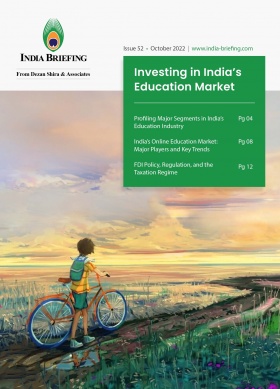India’s Draft Online Gaming Rules: What Investors Should Be Aware Of
India has published draft rules for online gaming in India and they are open for public consultation until January 17, 2023. According to the regulations, online games must register with a self-regulatory body, and only games approved by the agency would be able to legally function in India. Online gaming companies will not be allowed to engage in betting on the outcome of games. The rules have been well received by the industry’s key players since they will give the rapidly expanding sector the stability it needs.
On January 2, 2023, the Ministry of Electronics and IT (MeitY) published draft rules for online gaming in India. This move comes days after the federal government notified MeitY as the nodal body for regulating the online gaming and e-sports industries in India.
As per the rules, online games will have to register with a self-regulatory body, and only games cleared by the body will be allowed to legally operate in India. Online gaming companies will not be allowed to engage in betting on the outcome of games. The rules also stipulate provisions for mandatory know-your-customer (KYC) norms for verification, a grievance redressal mechanism, etc.
The proposed rules have been introduced as an amendment to the Information Technology (Intermediary Guidelines and Digital Media Ethics Code) Rules, 2021. The draft rules are open for public consultation until January 17, 2023, and are expected to be finalized by February. Businesses and stakeholders can submit their feedback on the rules at the InnovateIndia website.
While releasing the draft rules, Rajeev Chandrashekhar (Minister of State, MeitY) said, “Online gaming innovators will be the next big push for India’s digital economy and start up ecosystem. Draft IT Rules for online gaming aims to promote vibrant innovation ecosystem, protect gamer’s rights and lay down guardrails against online wagering/betting”. It must be noted that the Indian online gaming industry grew at a compound annual growth rate (CAGR) of 38 percent between 2017 and 2020, as opposed to eight percent in China and 10 percent in the US. Moreover, it is expected to grow at a CAGR of 15 percent to reach INR 153 billion in revenue by 2024, as per a report by VC firm Sequoia and management consulting company BCG.
Businesses must note that these draft rules not only legalize the status of online gaming in India, but also provide a mechanism to streamline their governance.
Here’s everything you need to know about how the proposed rules can be a game changer for the industry.
Draft rules for online gaming: Key provisions
Key definitions related to online gaming
- Online game: The draft rules define online game as a game that is offered on the Internet and is accessible by a user through a computer resource if they make a deposit with the expectation of earning winnings.
- Internet: The draft rules define internet as the combination of computer facilities and electromagnetic transmission media, and related equipment and software, comprising the interconnected worldwide network of computer networks that transmits information based on a protocol for controlling such transmission.
- Deposit: As per the draft rules, deposit means the deposit made or committed to, in cash or in kind, by the user for participating in an online game.
- Winnings: The draft rules on online gaming define winnings as any prize, in cash or in kind, that is distributed or intended to be distributed to a user of an online game based on the performance of the user and in accordance with the rules of such online game.
- Online gaming intermediary: As defined in draft rules, it means an intermediary that offers one or more than one online game.
Objective
- Regulation of online gaming platforms as intermediaries and setting in place due diligence requirements to be followed by such intermediaries.
- Encourage growth and innovation in the Indian online gaming sector, which the MeitY Minister described as “a very important piece of the start-up ecosystem and a part of the goal of the US$1 trillion economy.”
Self-regulatory body
- Online games will have to register with a self-regulatory body, and only games cleared by the body will be allowed to legally operate in India. The body must ensure that the registered games don’t have anything “which is not in the interest of the sovereignty and integrity of India, the defense of India, the security of the state, friendly relations with foreign states, or public order, or incites the commission of any cognizable offence relating to the aforesaid.”
- The self-regulatory body will have a board of directors with five members from diverse fields, including online gaming, public policy, IT, psychology, and medicine.
- There could be more than one self-regulatory body, and all of them will have to inform the federal government about the games they have registered along with a report detailing the criteria for registering.
Due diligence
- Online gaming companies will be required to perform additional due diligence, such as user KYC, transparent withdrawal and refund processes, and a fair distribution of winnings.
- For KYC, they will have to follow the norms laid down for entities regulated by the Reserve Bank of India (RBI).
Random Number Generation Certificate
- Gaming businesses will need to obtain a Random Number Generation Certificate, which is commonly used by websites that host card games to guarantee that game outcomes are statistically random and unpredictable.
- Additionally, they must obtain a “no bot certificate” from a reputable certification organization.
Restrictions on betting
Betting on the results of games will not be permitted by online gaming businesses.
Compliance
Online gaming firms would be required to hire compliance officers to make sure they are adhering to regulations, nodal officers to function as government liaisons and support law enforcement, and grievance officers to handle user complaints, just like social media and e-commerce enterprises.
Content regulation
According to MeitY Minister Chandrashekhar, the government may also regulate the content of online gaming in the future and ensure that the games do not have violent, addictive, or sexual content.
How have stakeholders reacted to the proposed rules?
While some stakeholders have welcomed these laws that try to protect users’ interests, others are seeking a more robust mechanism in the form of separate legislation.
All India Gaming Federation, the apex body for online skill-based gaming in India, lauded the draft guidelines, saying they finally address the long-standing need for legislation that is tailored to govern gaming intermediaries.
Sai Srinivas (co-founder and CEO, MPL) welcomed the release of the draft rules, stating that they will bring online gaming under uniform, central regulation.
While the industry will continue to grow in the coming years, driven by technological innovation, increasing culturally relevant intellectual property (IP) creation, and increasing access to smartphones and high-speed internet in India, the necessary stability in the form of a centralized and uniform legislation has arrived at an ideal time, according to Saumya Singh Rathore (Co-Founder, WinZO games).
About Us
India Briefing is produced by Dezan Shira & Associates. The firm assists foreign investors throughout Asia from offices across the world, including in Delhi and Mumbai. Readers may write to india@dezshira.com for more support on doing business in in India.
We also maintain offices or have alliance partners assisting foreign investors in Indonesia, Singapore, Vietnam, Philippines, Malaysia, Thailand, Italy, Germany, and the United States, in addition to practices in Bangladesh and Russia.
- Previous Article Latest Updates on India’s FTAs in 2022
- Next Article An Introduction to Doing Business in India 2023 – New Publication from Dezan Shira & Associates








